Docklands Summit offers chance to reset the precinct with Central Pier taking precedence
Development Victoria’s acting group head of precincts Niall Cunningham has remained tight-lipped about what the future redevelopment of Central Pier holds, saying he would not want to prejudice forthcoming community consultation.
Speaking in front of more than 100 people who gathered for the Docklands Summit on September 2 – a much-anticipated platform for the community and stakeholders to voice their aspirations for Docklands which has struggled to make a post-COVID comeback – Mr Cunningham said, “We are very much in listening mode right now, and I think it’s really important that we get this right.”
“We all share that ambition that we want to see the right things happen in terms of the generation of that space,” he said, but maintained Development Victoria (DV) – which is responsible for the planning and delivery of Docklands’ urban revitalisation – would wait until it heard from the community before “we can have a discussion about what’s next for Central Pier, but certainly not before that”.
“I wouldn’t dare to prejudice a consultation process and answer it with a predetermined outcome. It’s very, very important that we’re in listening mode.”
Mr Cunningham, who was one of seven panellists chosen to speak at the summit held at Marvel Stadium, made the remarks in response to questions from the City of Melbourne’s CEO Justin Hanney, which included what the future of Central Pier looked like and what “better action” could be made to activate the area while awaiting the pier’s redevelopment.
Mr Cunningham said as part of the regeneration of Central Pier, “there also exists an opportunity for interim activations” along Harbour Esplanade but stopped short of suggesting what ideas could be explored, saying “again, we will be putting that on the table as part of the consultation process.”
According to a City of Melbourne report in September, which provided an update on the summit, DV had advised that community engagement on Central Pier’s concept plans would begin in December to inform a business case and a subsequent state budget bid.
The state government announced in August that it would lodge a heritage permit application to demolish the 100-year-old structure after its permanent closure in late 2019 due to safety concerns.
DV has maintained it would work closely with Heritage Victoria, the City of Melbourne, the community, and other key stakeholders to identify opportunities for the revitalisation of Central Pier and adjacent waterfront areas to create one of “Australia’s premier waterfront destinations”.
According to the council’s report, the redevelopment of Central Pier and Harbour Esplanade was a “major city-shaping project that will redefine the city’s connection to Victoria Harbour and reframe community perceptions of Docklands”.
The issue was at the centre of discussions held at the summit, which saw various state government departments as well as developers and major landowners, local businesses, representative groups, and other stakeholders gather to participate in various workshops.
The City of Melbourne hosted the event after councillors voted in February “to elevate the urgent need for action and generate enthusiasm and outcomes for the regeneration of Docklands”, as the precinct had struggled to bounce back after the pandemic – which had been exacerbated by the closure of its two biggest landmarks: Central Pier and the Melbourne Star Observation Wheel.
A report last year found the pier’s closure alone – which formerly housed pubs, restaurants, and tourism operators – would cost Melbourne’s economy $865 million and 1500 jobs by 2024.
In addition to Harbour Esplanade and Central Pier being a focus for the precinct’s longer-term vision, preliminary feedback to the council included “simplifying the governance” in Docklands, celebrating the water as a unique element of Docklands, strengthening the identity of Docklands, supplementing existing events with regular community or place-based activations, and creating more green spaces by exploring pocket parks, biodiversity links, and “softening the existing built form”.
Public realm improvements such as landscaping, seating, and lighting were also highlighted as was wayfinding and improving navigation between precincts. Furthermore, the feedback called for an “anchor institution or drawcard destination” to change public perception and improve connections to Docklands from existing suburbs to the north and east.
Council management will review the feedback and identify short-, medium- and longer-term projects before a report comes back in October, providing a comprehensive overview of the summit.
The findings will include “clear actions and maintain engagement and the involvement of the Docklands community” through an online Neighbourhood Portal due to be launched in October.
The City of Melbourne hosted focus group sessions involving more than 80 people from August 8 to 21, which was the first phase of the Docklands Summit.
“The key takeaways we heard [were] that locals love Docklands – the locations, what is on offer and the services they frequently use,” a summary report said, but “the key issue is that this does not align with the public perception of the Docklands and what might appear in the media.”
Speaking to Docklands News after the summit, Lord Mayor Sally Capp said there was a “broad range of really good ideas” discussed, adding the “energy in the room was fantastic”.
“This was an opportunity for everybody to come together and listen to and hear from each other,” she said.
“The fact that the summit went through both hearing ideas and then prioritising those ideas, is for the first time we’ve done something like that with everybody in the same room, which was fantastic.”
In addition to Mr Cunningham, other panellists who shared their experiences in Docklands included Lendlease state lead and executive development director Brian Herlihy; AFL property development general manager Matthew Chun; Ashe Morgan development director Andrew Whiteside; ANZ talent and culture group executive Kathryn van der Merwe; Docklands Primary School principal Adam Bright; and Yarra’s Edge resident Jenny Leyva de Loryn.
Mr Chun said that while Marvel Stadium was an asset, it had over time become a “bit of a blocker” but added “we’re creating what we hope to be the Fed Square of Docklands”.
“We trying to make the stadium an asset that everyone can use so it’s a community asset, we see it as a community asset, and we want everyone to enjoy it, not just on event days,” he said.
“We are really changing the narrative of this stadium and this precinct and hopefully it’s the start of getting people to come from the city and other places and dwell in Docklands.”
In terms of driving initiatives to support Docklands’ revitalisation, Mr Herlihy said Lendlease would strive to “create something that’s authentic to the city” and believed there was an opportunity bring together the “culture and creative uses” in Docklands “not just for us but for the whole precinct”.
He said partnerships with Development Victoria, the City of Melbourne, and private developers were “really important” in community projects, with the Library at the Dock being one example.
“I think there’s a real opportunity to do more of that and bring that level of community infrastructure,” he said, adding the community also needed a “strong voice” in the next two decades to contribute to the “stitched-in and authentic part of the overall mental map” of the city and Docklands.
Ms van der Merwe said bringing office workers back was important and ANZ would find ways to “collaborate and do those things we need them to do when they come into the workspace”.
“We recognise the world of work has changed, people really do value working from home and we respect that and want to continue to encourage that,” she said.
“We’re not trying to compete with working from home, we’re trying to make it an experience when you come into the workplace feel different … that’s about coming in together, spending time together in spaces to have shared meals, shared drinks after work.”
Speaking of his aspirations for Docklands’ future, Mr Whiteside of Ashe Morgan said, “We actually need to reimagine what we have and where we’re going.”
“We see our future as much more connected to North Melbourne and the north-west of Melbourne. All that investment that is going on in Arden and Parkville, all those people want to come to the water … that is another 200 to 250 hectares, that’s another Melbourne CBD of people who are creative knowledge workers who can access the water … it will help give us an underpinning.”
The future of Docklands Primary School was also discussed, with principal Adam Bright saying the school’s projected growth from 466 students to 1000 in coming years would pose challenges, and that they were currently working with the Department of Education “on what our school will look like next year”.
“Our kids deserve community spaces that they can play in and congregate in before and after school, they deserve access to a swimming pool in the suburb,” he said, adding “it would be fantastic” to be able to use spaces like Marvel Stadium.
Mr Bright said opening the brand-new school during the pandemic had also been challenging, noting, “we haven’t been able to link with our community” and while students could use Ron Barassi Snr Park, ideally the school needed “pocket parks” closer to its grounds.
In other talks, Yarra’s Edge resident Jenny Leyva de Loryn said while she loved the “community feel”, she believed better connections were needed as some people “feel ashamed” and “don’t actually tell people they live in Docklands”, which was “really saddening because I love living in Yarra’s Edge”.
“We do see ourselves as very different to the other side. One of the differences is we aren’t allowed to come to the school,” she said.
When asked how better connections could be made, Ms Leyva de Loryn said, “so many come to Marvel Stadium, but then what do they do? They go home.”
But when she suggested holding a Yarra’s Edge neighbourhood day, she said “I don’t want to do it for all of Docklands.”
In chairing the panel, Mr Hanney spoke briefly but did express excitement for Greenline – the Lord Mayor’s passion project that would see a four-kilometre promenade built along the north side of the river from the Bolte Bridge to Birrarung Marr, which he described as “really quite exciting in terms of the numbers of people it will bring – not just into Melbourne but right all the way to Docklands”.
He also gave praise to Mr Chun’s “great suggestion” of encouraging “people invested in this community” to spend their money locally.
While Mr Chun said the Docklands Dollars initiative was critical to this, he emphasised “the more money that we can keep in here, the more people we can keep in business, the more shops that are open the better the vibe is going to be”.
However, in his closing remarks, Mr Hanney told the audience that addressing short-term priorities for Docklands was just as crucial after conceding these types of events “can often be a talkfest and if you leave here and nothing happens, the next time we come together people go ‘please, not again’.”
“The key to this is can we let the top 10 issues [take priority] and bear down on them; actually make them happen, and collectively – not just the responsibility of Development Victoria, not just the responsibility of Ashe Morgan or all the residents, or ANZ or Lendlease or the school,” he said. “[It’s] all our responsibility in terms of if we work together and lean into some of these – what might we be able to achieve in a very short period of time.”
The Lord Mayor said the summit overall had shown there was a “shared desire to move forward” with Central Pier being of particular focus, adding DV’s update about what would happen over the next 12 months had “started to really bring some clarity, but also, just to know that it’s a priority for everyone down there”.
Cr Capp was also impressed with the presentation from Mr Chun and the AFL’s aspirations for creating a community space at Marvel Stadium as part of its major revamp, which would “really open it up” so “it’s not just activated on game days”.
Other “key elements” Cr Capp took away from the summit was the need to “help people understand the DNA of Docklands” as a waterfront city.
“We often refer to Docklands as one big, enormous area and it’s confusing for people because if you’re not from Docklands, you don’t understand the nuances and the neighbourhoods within Docklands, and so starting to really bring to life the various areas and precincts within Docklands is a good important step,” she said.
The Lord Mayor said the report before council at the Future Melbourne Committee meeting on September 20 “brings the whole sort of conversation together and sets us up for next steps”.
Deputy Lord Mayor Nicholas Reece told the council meeting that “one of the key takeaways from the summit was the powerful reminder to me that we do have a strong existing identity and character that has developed naturally in Docklands”.
“I do think there’s a huge opportunity for us to leverage a really important vibrant, emerging community, which I think will actually be part of the secret source of a vibrant, prosperous, Docklands,” he said.
DV’s Niall Cunningham said there would be “ongoing conversations” to “understand what it is people really want in terms of the identity across the neighbourhood”.
Cr Jamal Hakim, a Docklands resident and avid advocate for the community, said while Docklands was the “water gateway to our city”, there was a “need to celebrate Docklands more”.
“We need to improve that public perception in the area. It’s been the target of criticism for far too long,” he said, and this was “about drawing a line in the sand and moving forward with all stakeholders”.
“We heard that large events and activations such as Firelight have been terrific for Docklands and we need to bring in through some smaller scale community-based initiatives as well, which is terrific to hear from our community and something that’s obviously being considered.” •

Council “plays hard ball” over Port of Melbourne land rezoning
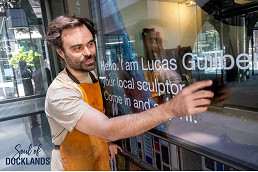


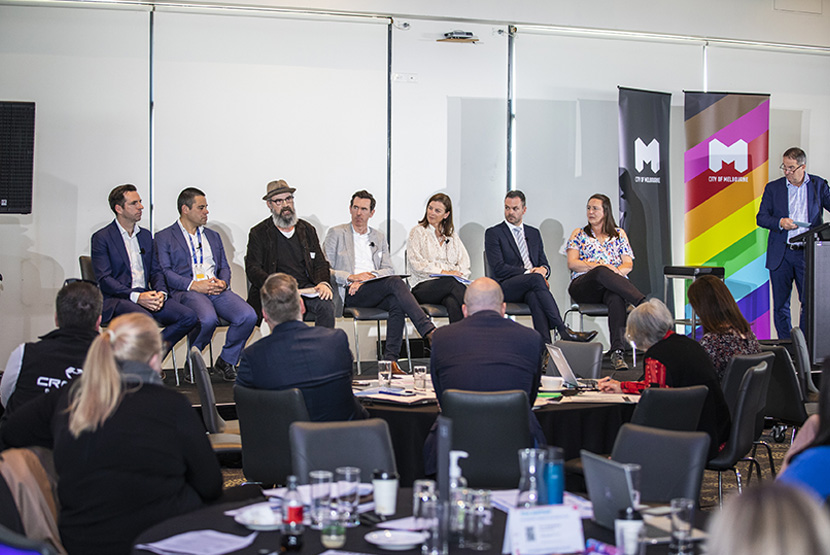
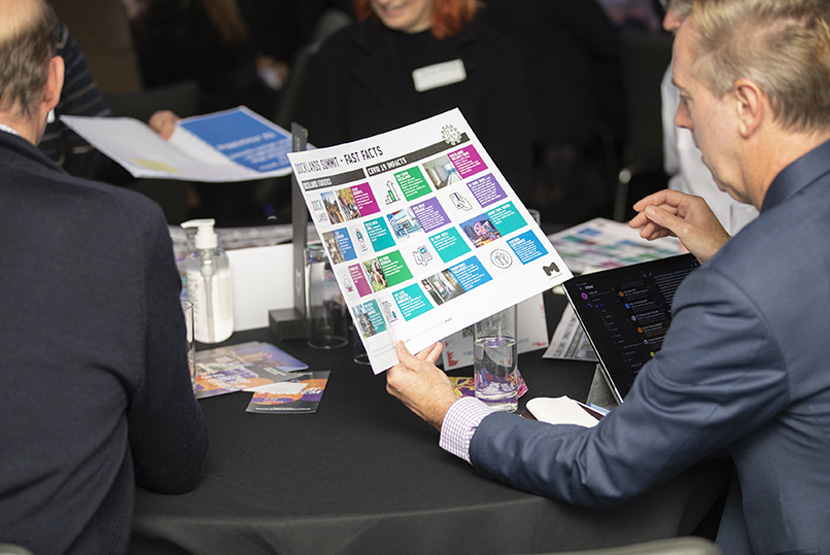
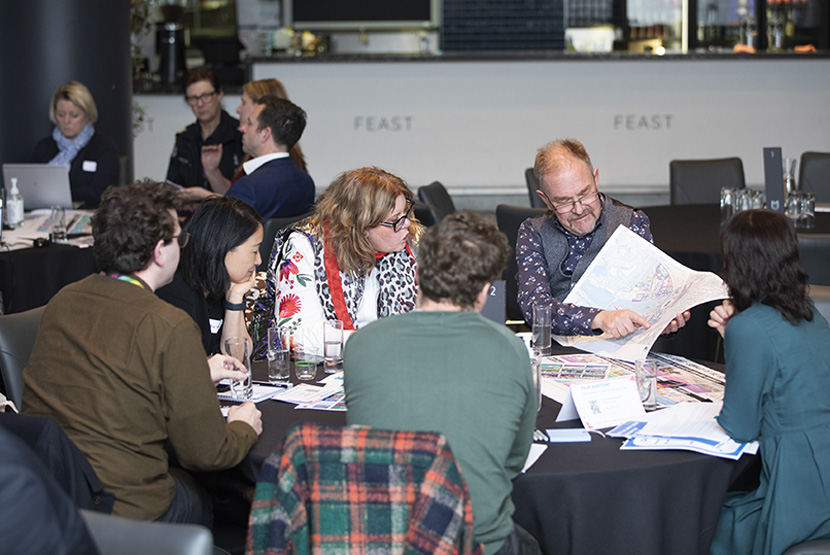




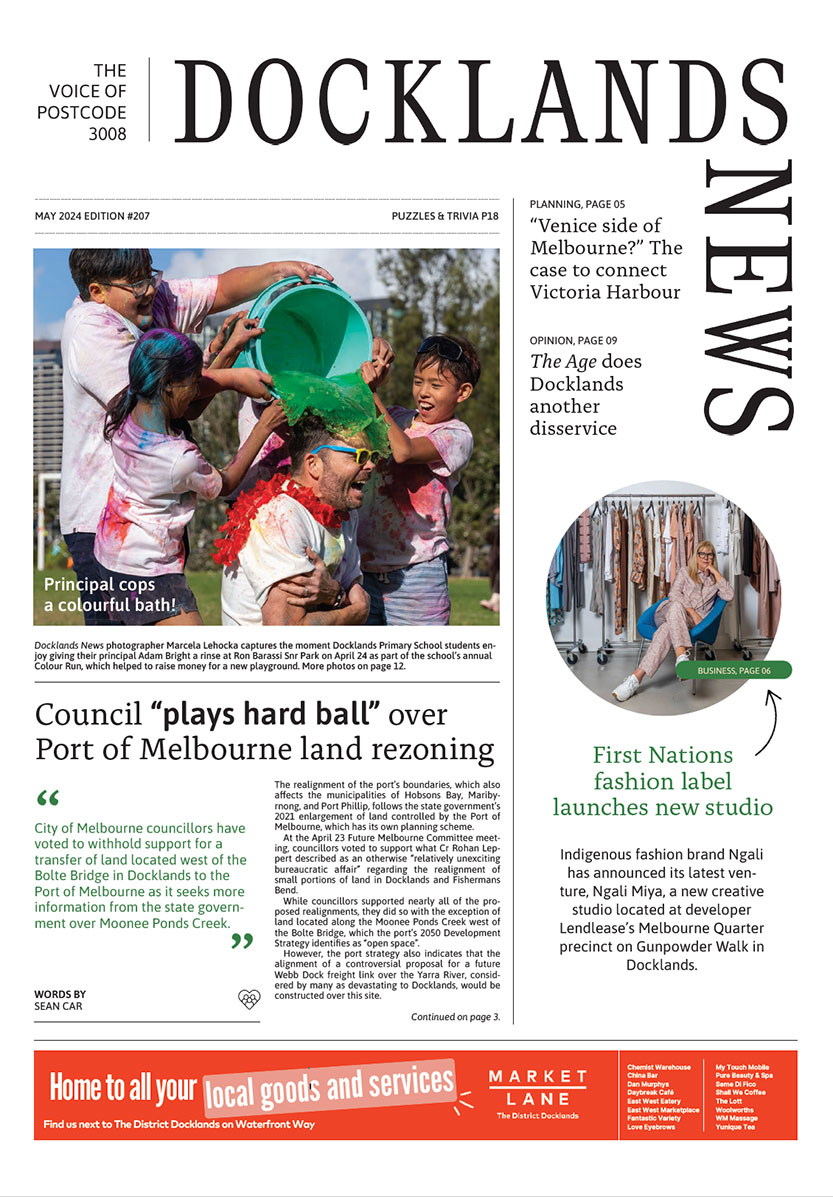 Download the Latest Edition
Download the Latest Edition
